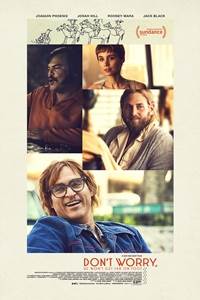‘Don’t Worry, He Won’t Get Far on Foot’ gets horribly lost
Directed by: Gus Van Sant
Written by: Gus Van Sant, Jack Gibson and William Andrew Eatman, based on the book by John Callahan
Starring: Joaquin Phoenix, Rooney Mara, Jonah Hill, and Jack Black
“Don’t Worry, He Won’t Get Far on Foot” – According to Google, a mess is defined as a situation or state of affairs that is confused or full of difficulties.
Gus Van Sant’s “Don’t Worry, He Won’t Get Far on Foot” - a biopic about cartoonist John Callahan’s life after a car accident left him mostly paralyzed at age 21 - is a mess.
A confusing mess, one that Van Sant overcomplicates and creates narrative difficulties, where none should exist.
A successful film adaption of John’s story should be a foregone conclusion with Van Sant guiding the cast and crew, and Joaquin Phoenix working his magic as the lead. Phoenix is a natural at playing troubled protagonists and just look to his work in films like “Signs” (2002), “Walk the Line” (2005), “Her” (2013), “Inherent Vice” (2014), and “You Were Never Really Here” (2018) as clear examples.
Here, Phoenix dives headfirst into this role and into the bottom of various bottles of on-screen alcohol. Before his brand-new friend Dexter (Jack Black) slams his blue Volkswagen into a light pole at 90 mph - with John in the passenger seat - the future cartoonist sports a look that can best be described as: disheveled junkie. (Note: alcohol-induced) With an uncombed, stringy mop of rusty-red hair and a Hawaiian shirt last spotted inside a Palm Springs casino, John drifts around Los Angeles and into Dexter’s car for an all-night bender of drinking and driving that ends terribly.
After local police pick up the broken pieces (including John) off the road, our lead now faces the emotional torture of confronting his new, life-changing mobility struggles and his already-existing drinking problem.
Annu (Rooney Mara), an approachable nurse, who resembles a dreamlike, infinitely empathetic angel from a planet of smiles, and Donnie (Jonah Hill), a blonde-haired and blunt Alcohol Anonymous mentor bound by his laid-back mental-handbook, help guide John from the darkness of both afflictions.
Most regrettably, Van Sant’s end product is afflicted and horribly jumbled by a clunky, non-linear timeline that seems to serve no point other than to possibly deliver an organic, unrefined 1-hour and 53-minute event for the audience.
Walking out of the theatre, one will certainly absorb John’s collective mass of encounters towards his hopeful sobriety and sense of purpose. Yes, the picture does convey these concepts from screen to theatre seats, but under a muddled arrangement of individual occurrences, each one lasting a few minutes with little connective tissue to the very next scene. At times, John truly works on his addictions with minor breakthroughs, but then plunges back into despair. Sure, recovering alcoholics may temporarily fall from their ascendant paths, but Van Sant does not apply known rhymes or reasons for John’s patterns in his celluloid bio.
Sometimes, the subsequent images fall within a linear timeline, and other times, they don’t. Annu pops into town for a quick lunch or shopping spree and then disappears for 40 minutes of screen time. Carrie Brownstein (“Portlandia” (2011 – 2018)) plays some sort of insurance agent who releases money and resources for John. Apparently, Suzanne (Brownstein) is an important character, but she first appears around the 55-minute mark (this is a guess) during a hasty shouting match with John.
Are we supposed to know her? Evidently. Who is she again?
Non-linear timelines can work extraordinary well (see “Pulp Fiction” (1994) and “Memento” (2000)), but they should serve a specific objective, and it’s hard to find one in this film.
Worst of all, the construction lays waste to Phoenix’s compelling, transformative performance. John swallows and explodes with feelings of regret and loss throughout most of the picture, but his road to recovery becomes stymied by narrative cul-de-sacs that cutoff his route. Momentum is lost through sudden downshifts into completely different gears, as Van Sant halts our emotive beats and then asks for jump-starts 18 minutes later.
Sorry, this critic cannot exactly operate that way, and although humans can be messes at times, our movie experiences should not be cluttered ones.
(1.5/4 stars)
Jeff – a member of the Phoenix Critics Circle – has penned film reviews since 2008 and graduated from ASU’s Walter Cronkite School of Journalism. Follow Jeff and the Phoenix Film Festival on Twitter @MitchFilmCritic and @PhoenixFilmFest, respectively.










